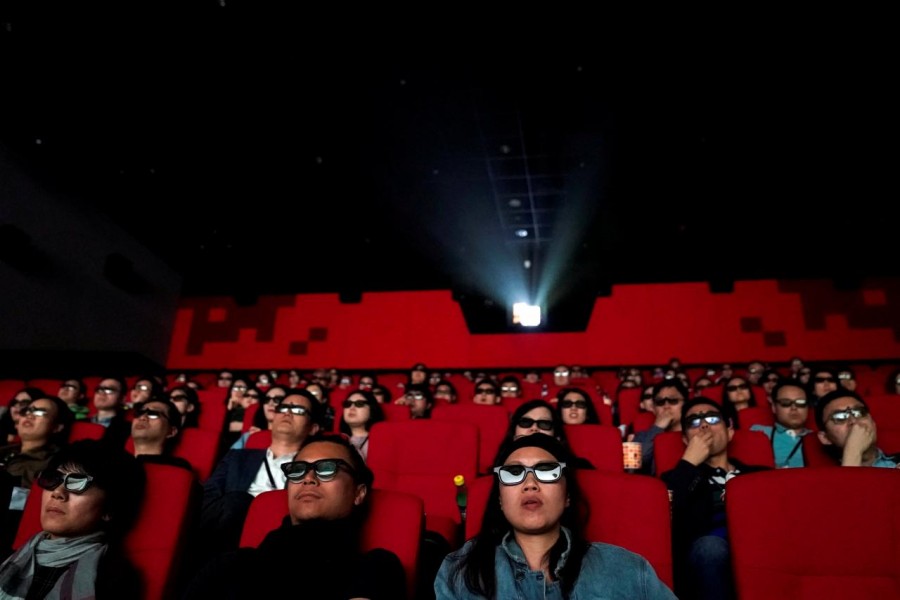Hollywood’s push for greater access to China’s booming film market - delayed since last year - has become tangled in broader trade talks between Washington and Beijing, a potentially thorny position amid whipsawing trade relations.
Negotiations to raise a Chinese quota on imported films and boost the share that overseas producers get of box office takings are now being discussed within the broader framework of a US-China trade stand-off, four industry sources said.
The shift from earlier talks is a double-edged sword for US producers looking at China’s $8.6 billion cinema market. It could be bad news if broader talks go sour, but it could offer a potential path forward if the two countries find common ground.
“It wouldn’t really hit the domestic movie business much whether we bring in more foreign movies or not,” said Yu Jianhong, vice president of Beijing Film Academy. “This should be something both parties can agree on.”
China’s quota system allows 34 imported movies a year to be shown in theatres, while overseas producers get a 25 per cent share of box office takings - less than in other international markets. Since 2016 a handful more have been allowed in via a “cultural exchange” channel.
In a government document provided to the US delegation in Beijing two weeks ago, Chinese negotiators said that opening up the market more for US movies was a concession China could offer to Washington as part of a broader trade deal.
The document, seen by Reuters, said that China was “willing to discuss expanding movie imports with the US side”.
Chinese Vice Premier Liu He is currently in Washington leading a Chinese trade delegation on a second round of talks to find a deal with the United States and avert a full-blown trade war between the world’s two biggest economies.
China on Friday said it was dropping an anti-dumping probe into imports of US sorghum, a conciliatory gesture hours after US officials familiar with the matter said China was offering a package to slash the US trade deficit by up to $200 billion.
On Thursday, US President Donald Trump criticised China as being “very spoiled” on trade with the United States but said he was aiming for an overall deal with Beijing.
“On pause”
US studios had hoped for an improved deal for imported films last year. This, however, had been held up as Beijing rejigged its film regulator, handing more control to the ruling Communist Party, and then as trade tensions with the United States grew.
“The movie deal is essentially on pause,” one person familiar with US-China negotiations on the movie agreement told Reuters, adding that Beijing’s willingness to ease up would likely be swayed by the state of trade tensions.
Hollywood producers are pushing for more access, but a bigger share of revenues was even higher on the agenda, especially as locally-made productions became more competitive.
China has become a key market for US studios from Walt Disney Co to Universal Pictures. “The Fate of the Furious”, the latest instalment of Universal’s “The Fast and the Furious” franchise, was the second top grossing film in China last year while “Avengers: Infinity War” has taken 1.6 billion yuan ($251.23 million) so far this year.
China’s box office revenue rose 13.45 per cent last year to 55.91 billion yuan, accelerating after a sharp slowdown in 2016.
Jacob Parker, vice president of China operations at the US-China Business Council, said firms were more concerned about the revenue split for films they brought to China, though higher quotas would be well received too.
“Profit sharing is a higher priority,” he said, and studios “would like to see 45 percent as opposed to 25 percent.” He added: “Forty-five percent is what companies receive in most other markets where they operate.”
Hollywood movies, which once ruled in China, are seeing a rising challenge from locally-made productions, while a spate of tie-ups and financing deals have gone sour amid cultural clashes and a brighter spotlight on risky Chinese investments.
China is also looking to tighten control over content, potentially at odds with allowing in more overseas productions, which generally will have to get past domestic censors.
“China has pledged to open its market on a lot of fronts, but you have to consider the special aspect of culture and entertainment industry,” said Beijing Film Academy’s Yu.
“It has the education and ideology feature so it would be treated differently.”


